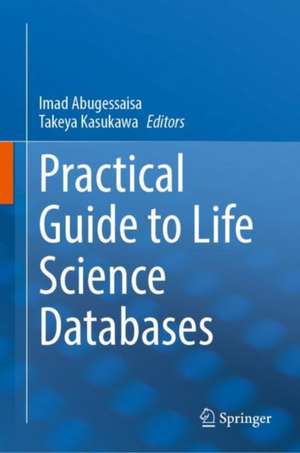Practical Guide to Life Science Databases
Editat de Imad Abugessaisa, Takeya Kasukawaen Limba Engleză Hardback – 6 ian 2022
Chapter 2 is available open access under a Creative Commons Attribution 4.0 International License via link.springer.com.
| Toate formatele și edițiile | Preț | Express |
|---|---|---|
| Paperback (1) | 2444.15 lei 38-44 zile | |
| Springer Nature Singapore – 7 ian 2023 | 2444.15 lei 38-44 zile | |
| Hardback (1) | 2844.43 lei 3-5 săpt. | |
| Springer Nature Singapore – 6 ian 2022 | 2844.43 lei 3-5 săpt. |
Preț: 2844.43 lei
Preț vechi: 3468.82 lei
-18% Nou
Puncte Express: 4267
Preț estimativ în valută:
544.28€ • 593.07$ • 458.64£
544.28€ • 593.07$ • 458.64£
Carte disponibilă
Livrare economică 02-16 aprilie
Preluare comenzi: 021 569.72.76
Specificații
ISBN-13: 9789811658112
ISBN-10: 9811658110
Pagini: 224
Ilustrații: X, 224 p. 1 illus.
Dimensiuni: 155 x 235 mm
Greutate: 0.4 kg
Ediția:1st ed. 2021
Editura: Springer Nature Singapore
Colecția Springer
Locul publicării:Singapore, Singapore
ISBN-10: 9811658110
Pagini: 224
Ilustrații: X, 224 p. 1 illus.
Dimensiuni: 155 x 235 mm
Greutate: 0.4 kg
Ediția:1st ed. 2021
Editura: Springer Nature Singapore
Colecția Springer
Locul publicării:Singapore, Singapore
Cuprins
Chapter 1: GENCODE Annotation for the Human and Mouse Genome: A User Perspective.- Chapter 2: Genecard a database for gene annotation.- Chapter 3: IHEC: International human epigenome portal.- Chapter 4: Atlas of miRNAs and their Promoters in Human and Mouse.- Chapter 5: RefEX- Reference Expression Dataset.- Chapter 6: The mouse Gene Expression Database.- Chapter 7: ChIP-Atlas.- Chapter 8: Protein structural changes based on structural comparison.- Chapter 9: Single Cell Databases: an Emerging and Essential Tool.- Chapter 10: scIVA: Single Cell Interactive Visualisation and Analysis Data Mining Platform.- Chapter 11: Access and visualise high quality gene expression data with Stemformatics.- Chapter 12: Introduction to Practical Guide to Life Science Databases.
Notă biografică
Imad Abugessaisa, Laboratory for Large-Scale Biomedical Data Technology, RIKEN Center for Integrative Medical Sciences, Yokohama, Kanagawa, Japan
Takeya Kasukawa, Laboratory for Large-Scale Biomedical Data Technology, RIKEN Center for Integrative Medical Sciences, Yokohama, Kanagawa, Japan
Textul de pe ultima copertă
This book provides the latest information of life science databases that center in the life science research and drive the development of the field. It introduces the fundamental principles, rationales and methodologies of creating and updating life science databases. The book brings together expertise and renowned researchers in the field of life science databases and brings their experience and tools at the fingertips of the researcher. The book takes bottom-up approach to explain the structure, content and the usability of life science database. Detailed explanation of the content, structure, query and data retrieval are discussed to provide practical use of life science database and to enable the reader to use database and provided tools in practice. The readers will learn the necessary knowledge about the untapped opportunities available in life science databases and how it could be used so as to advance basic research and applied research findings and transforming them to the benefit of human life.
Chapter 2 is available open access under a Creative Commons Attribution 4.0 International License via link.springer.com.
Caracteristici
Introduces the principles, rationales and methodologies of creating and updating life science databases
Includes detailed demonstration examples and specific use-cases for each database
Provides readers and researchers with the fundamental grip to publish and share their data
Includes detailed demonstration examples and specific use-cases for each database
Provides readers and researchers with the fundamental grip to publish and share their data
